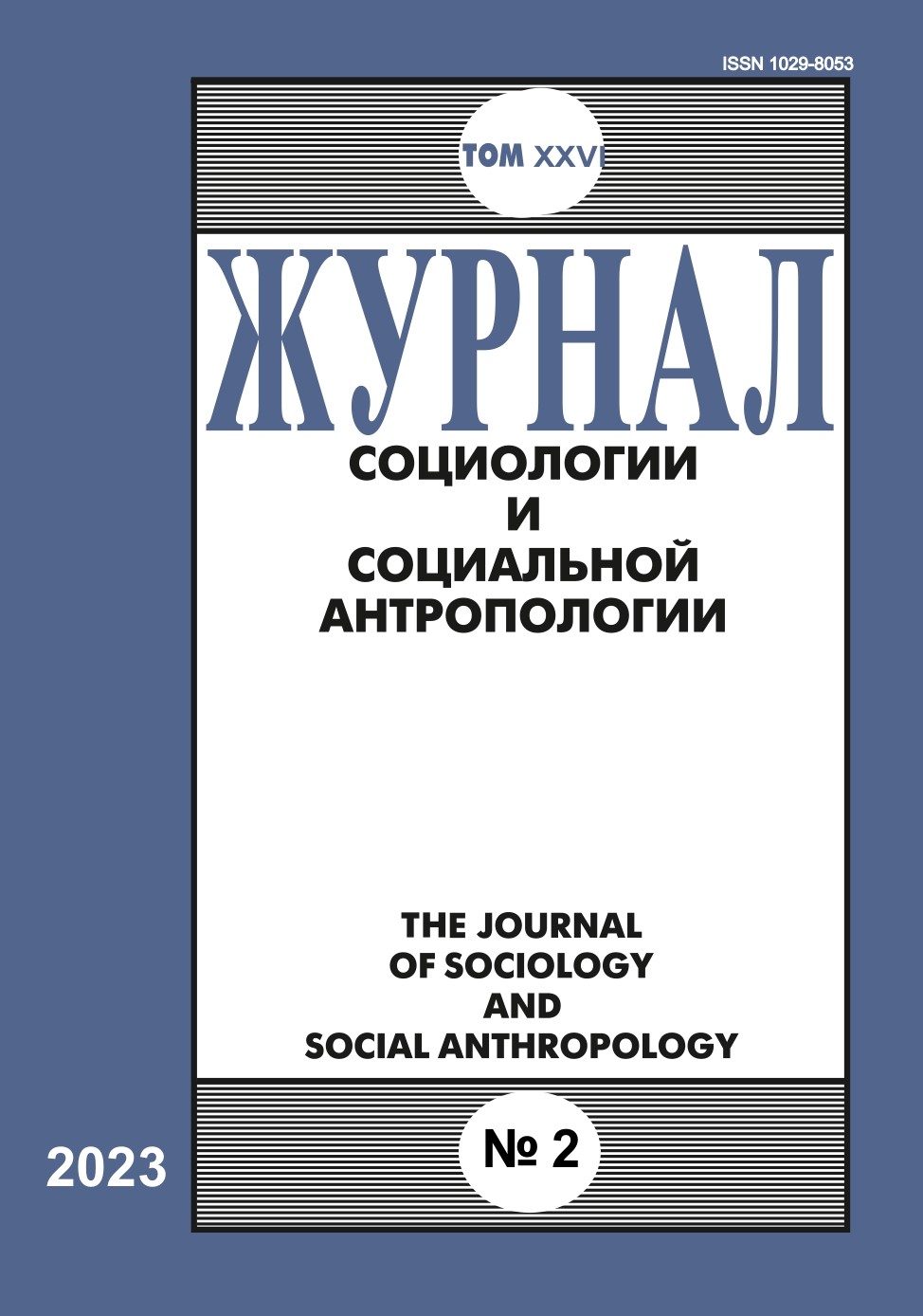The demand for information on a healthy lifestyle and lessons learned during the coronavirus pandemic
Abstract
This article contains an analysis based on data from the “Russian Longitudinal Monitoring Survey” (RLMS-HSE) of the COVID-19 pandemic’s influence on the demand among Russian people for information on a healthy lifestyle. It is shown that, despite the fact that people began to pay much closer attention to health related issues during the onset of the pandemic, popular demand for such information remained be fairly low. Half of all surveyed Russian people take interest in information pertaining to a healthy lifestyle. However, only one in every sixteen people seeks it out intentionally. The highest demand for such information was registered among women, residents of large cities, as well as citizens who are highly educated. Additionally, the study showed that these particular respondents were also the most active when it came to learning in general and to being physically active. The connection between respondents’ demand for information on issues pertaining to a healthy lifestyle and their assessment of their own health status, as well as their evaluation of how the coronavirus pandemic and the associated restrictions affected their health, turned out to be fairly weak. Interest in knowledge that facilitates preservation and improvement of one’s health is more common among respondents who are more inclined than others to give a negative assessment of how the pandemic affected their health, though at the same time they find it easier and are quicker to adapt to new conditions. However, they are not much different from other categories of the population when it comes to assessing the efficacy of safety measures that were supposed to help mitigate the risk of getting infected with the coronavirus, as well as their implementation in personal practice. The demand for information on a healthy lifestyle is one of the factors that reduce negative attitudes towards administration of the coronavirus vaccine. The main causes of negative attitudes towards vaccination include a lack of faith in the vaccine’s efficacy, as well as fear of adverse effects, fear of negative health consequences. It’s worth noting that among the respondents who oppose the vaccines these reasons bear the most significance for those who show the least interest in issues pertaining to a healthy lifestyle.
References
Белова Н.И. (2009) Концепция социального конструирования реальности в применении к исследованию здорового образа жизни. Вестник РГГУ. Серия «Философия. Социология. Искусствоведение», 2: 291–295.
Белова Н.И. (2008) Парадоксы здорового образа жизни учащейся молодежи. Социологические исследования, 4: 84–86.
Белова Н.И. (2016) Здоровье и практики его сохранения/поддержания. Тощенко Ж.Т. (ред.) Жизненный мир россиян: 25 лет спустя (конец 1980-х — середина 2010-х гг.). М.: ЦСП и М: 113–129.
Бондин В.И., Мануйленко Э.В., Толстокора О.Н. (2018) Здоровый стиль жизни. М.: Мир науки [http://izd-mn.com/PDF/21MNNPM18.pdf] (дата обращения: 20.11.2022).
Варламова С.Н., Седова Н.Н. (2010) Здоровый образ жизни — шаг вперед, два назад. Социологические исследования, 4: 75–88.
Дудченко З.Ф. (2013) Психологическое обеспечение здорового образа жизни личности. Никифоров Г.Н. (ред.) Здоровая личность. СПб.: Речь: 356–367.
Ермолаева П.О., Носкова Е.П. (2015) Основные тенденции здорового образа жизни россиян. Социологические исследования, 4: 120–129.
Журавлева И.В. (ред.) (2014) Здоровье студентов: социологический анализ. М.: ИНФРА-М.
Ивахненко Г.А. (2022) Влияние пандемии COVID-19 на отношение россиян к своему здоровью: социологический анализ. Социология медицины, 21 (1): 109–116. https://doi.org/10.17816/socm109658.
Королькова А.C. (2020) Способы передачи негативной прагматической оценки концептуальной сферы «здоровый образ жизни» в блогосфере. Медиалингвистика, 7 (1): 83–94. https://doi.org/10.21638/spbu22.2020.107.
Кульпин С.В., Савчук Г.А., Якимова О.А. (2020) Зачем молодежь создает контент о здоровом образе жизни: факторный анализ тематических блогов. Мониторинг общественного мнения: экономические и социальные перемены, 2: 168–190. https://doi.org/10.14515/monitoring.2020.2.656.
Назарова И.Б. (2007) Здоровье занятого населения. М.: МАКС Пресс.
Новоселова Е.Н. (2021) Здоровье как ценность и результат деятельности: проблемы и противоречия. Вестник Московского университета. Серия 18. Социология и политология, 27 (3): 81–104. https://doi.org/10.24290/1029-3736-2021-27-3-81-104.
Паутов И.С., Паутова Н.И. (2014) Продвижение здорового образа жизни как инструмент реализации государственной политики в сфере охраны здоровья в современной России. Журнал исследований социальной политики, 12 (4): 493–508.
Петраш М.Д., Муртазина И.Р. (2018) Понятие «здоровый образ жизни» в психологических исследованиях. Вестник Санкт-Петербургского университета. Психология и педагогика, 8 (2): 152–165. https://doi.org/10.21638/11701/spbu16.2018.204.
Покида А.Н., Зыбуновская Н.В., Газиева И.А. (2022) Роль высшего образования в формировании здорового образа жизни (по результатам социологического исследования). Высшее образование в России, 31 (1): 72–88. https://doi.org/10.31992/0869-3617-2022-31-1-72-88.
Пузанова Ж.В., Чеховский И.В. (2014) Здоровый образ жизни: понимание и отношение студенческой молодежи (по результатам фокус-групповых исследований). Вестник РУДН. Серия: Социология, 4: 135–150.
Русанова А.М., Крючкова Н.В., Беляева Ю.Н. (2015) Оценка степени информированности населения по вопросам здорового образа жизни. Бюллетень медицинских интернет-конференций, 5 (5): 551–553.
Рязанцева М.В., Субочева А.О., Якушова Е.С. (2021) О формировании ценностей ЗОЖ студентов в постковидный период. Гуманитарные науки. Вестник Финансового университета, 11 (3): 93–98. https://doi.org/10.26794/2226-7867-2021-11-3-93-98.
Соколовская Т.А., Армашевская О.В., Бахадова Е.В. (2021) Приоритеты ценности здоровья у населения и влияние на них пандемии COVID-19. Социальные аспекты здоровья населения [сетевое издание], 67(3): 10. https://doi.org/10.21045/2071-5021-2021-67-3-10.
Спасенников Б.А. (2021) COVID-19: Уроки вакцинации. Бюллетень Национального научно-исследовательского института общественного здоровья имени Н.А. Семашко, 3: 116–125. https://doi.org/10.25742/NRIPH.2021.03.017.
Стерлядева Н.А., Чуканова Т.В. (2022) Некоторые аспекты самосохранительного поведения студенческой молодежи в период пандемии коронавируса. Социодинамика, 4: 50–56. https://doi.org/10.25136/2409-7144.2022.4.37752.
Улумбекова Г.Э. (2010) Здравоохранение России. Что надо делать: научное обоснование «Стратегии развития здравоохранения РФ до 2020 года». М.: ГЭОТАР-Медиа.
Fishbein M., Triandis H.C., Kanfer F.H. et al. (2001) Factors influencing behavior and behavior change. In: Baum A., Revenson T.A., Singer J.E. (eds) Handbook of health psychology. Mahwah, Lawrence Erlbaum Associates: 3–18.
Johnson N.G. (2003) Psychology and health: research, practice, and policy. American Psychologist, 58: 670–677.
Luszczynska A., Hagger M. (2016) Health Behavior. In: Benyaamini Y, Johnstone M., Karademas E.C. (eds.) Assessment in health psychology. Boston: Hogrefe Publishing: 60–72.

